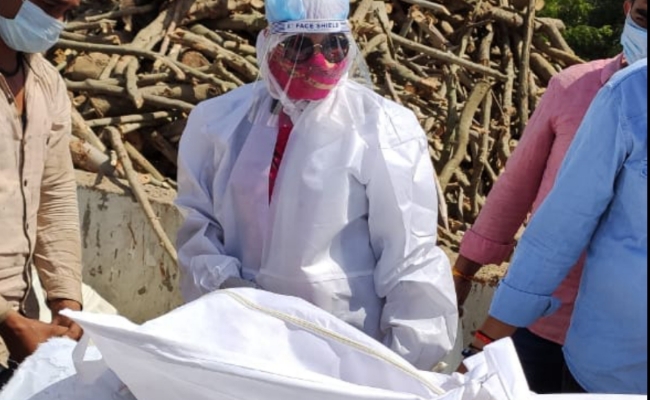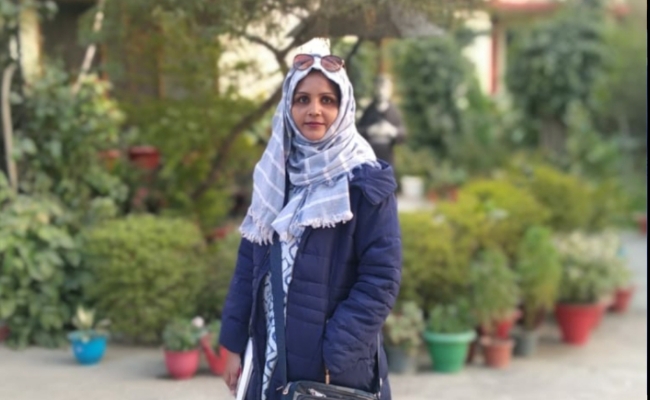Lucknow, UTTAR PRADESH :

Lucknow:
Azra Mobin has been through a whirlwind of emotions in the past few weeks. The 35-year old social worker in Lucknow, while fasting during Ramadan, has arranged the cremation of around 7-8 COVID-19 patients who had no one to cremate them.
The first cremation that she arranged and witnessed was of an 80-year-old Moolchandra Srivastava, a man she did not know until his son Gaurav called and pleaded for help.
Moolchandra had been infected with COVID-19 and was admitted in a private hospital in the city. His son was apprehensive of cremating the body because he has diabetes, and his brother and sister-in-law were also infected with the virus.
From Aliganj, where she lives, she went to take the body and in ambulance went to Baikunth Dham to get him cremated. Accompanying her was Deepak, a friend of hers. Not just for help, but she had also asked Deepak to tag along for a better understanding of the last rites.
It was a hot sunny day and Mobin was fasting as well. Wearing the Personal Protective Equipment (PPE) suit, she started to feel dizzy. Mobin said, “I thought I would faint near the pyre where the body was burning, and I sat on a slab nearby. But I wanted to make sure the body was cremated first.”
Two crematorium workers, one of them named Khurshid, she recalled, also helped her during the cremation.
“Humein mazhab se matlab nahi hai, bas aisa nah ho ke kisi ki laash reh jaye,” said Mobin. (I don’t care about the religion; I just don’t want anyone’s body to be left behind.)
It all started last month when she felt helpless and numb hearing one devastating news after another. On 19 April, she posted her number on Facebook, asking people to contact her if any help needed for cremations.
The incident that still shakes her core
One day, after iftar, she had a conversation with a young 21 year old boy, Aman Srivastava that still breaks her heart.
Aman could not stop crying on the call. He was at Raebareli road and he had reached out for help for his mother but by then she had passed away. Aman has a younger sister. His father was in isolation and in a critical condition.
He was breathing heavily so Mobin asked him if he has COVID-19, to which he said, “No. I don’t. I just haven’t eaten anything. I miss my mother, how can I even eat?”
She tried to comfort him and assured that she is available if any help needed. The following day, she was back to arranging other cremations.
All this while, she could not stop worrying about the boy and wondered why he had not called. A few days later, his sister answered her call.
“The day after you called, my father passed away. The next day, my brother whom you spoke to, Aman also passed away. My grandmother, in this shock of these deaths, also passed away.” his sister said.
Already quite disturbed, Aman was told to take the ashes to Kanpur. He got in an accident and and passed away.
This hit Mobin really hard. She assured all help to the girl and her relatives, yet in that moment she felt nothing but helpless.
Throughout this second wave of the pandemic, one which has wreaked havoc in the urban and rural spaces, citizens keep trying to fill the gap created by the authorities. The onus to help with leads, provide materials and services have fallen on the shoulders of the locals. In an ideal world, citizens should not have had to do this.

‘No matter what your faith Is, I’m here to help’
Traditionally in India, Hindu or Muslim women do not participate in last rites, visit the cremation grounds or cremate the bodies.
For some families, generally, she said, they are scared to cremate or go to the cremation grounds. Either the family members are not available or they are self-isolating. A lot of times neighbours have also refused to help.
After the first cremation, Mobin received a lot of messages of encouragement from people. From a Muslim cleric to strangers, they all sent their prayers and that emboldened her to continue working.
“I thought about the people that have been cremated — did they even know me? Did they ever think their family will not be cremating them?” I think, maybe, God made me connected to them for a reason,” she said.
Mobin is a mother of two, an 11-year-old girl and a 9-year-old boy. When she decided to help during the pandemic, she sent them to their grandmother’s house. Mobin’s mother was worried and disapproved of the work initially, but Mobin is not one to back down. “I tell my mother I have gotten this altruistic spirit from her that she cannot do much about,” she said.
When she returns from the cremation ground, she discards the PPE suit and self-isolates.
Uttar Pradesh on Thursday reported 17,745 new coronavirus cases, 277 deaths in 24 hours. Out of the deaths, more than 20 were from Lucknow. The government, however, has been accused of reportedly concealing the numbers.
On being asked if she fears any action from the government, Mobin said, “I am not scared of talking about the reality on the ground. If they think by highlighting the reality, people are spreading ‘rumours,’ then they can come with me on the ground, see and hear the cries of the people. I have seen people losing their lives on the road.”
As she continues to attend to SOS calls, she also thinks of her future. “What if tomorrow when I die, I have no one to cremate my body? I would like to think that someone will be there for me when my time comes,” she remarked. The only positive note here, she says is that the calls for cremation have reduced in the past couple of days.
Aliza Noor is a multimedia journalist based in Lucknow.
source: http://www.maktoobmedia.com / Maktoob / Home> Features India> North India / by Aliza Noor / May 14th, 2021








